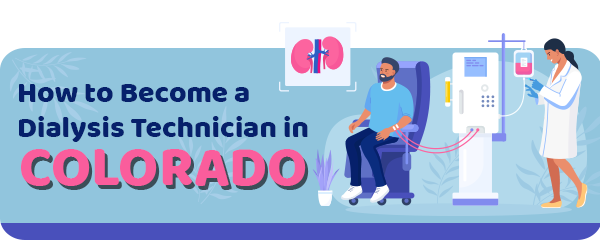Without dialysis machines and skilled operators, many lives would face significantly shortened lifespans.
This highlights the crucial role of dialysis technicians in the healthcare industry.
While operating a dialysis machine may not sound glamorous, it can be a fulfilling profession for those who aspire to make a positive impact on others’ lives.
If you’re interested in learning more about this occupation, check out the article below.
Article Table of Contents
Dialysis Technician Job Description in Colorado
Choosing a career without understanding your responsibilities isn’t advisable.
The first thing to know is that dialysis technicians in Colorado work with patients who have kidney-related issues.
Their primary duty is to ensure the dialysis machine’s proper functionality and operate it according to each patient’s specific needs.
Here are some additional responsibilities associated with this profession:
- Monitoring patients’ vital signs.
- Assisting patients during the dialysis procedure.
- Ensuring the safety and comfort of patients.
- Reviewing patients’ medical histories to identify any additional conditions that require attention during the procedure.
- Adjusting dialysis machines based on individual patient requirements.
- Administering oxygen if necessary.
- Providing basic Cardiopulmonary Resuscitation (CPR) if needed.
These represent some of the most common job duties of dialysis technicians, although their day-to-day tasks may vary.
Dialysis Technician Requirements in Colorado
In Colorado, individuals pursuing a career as dialysis technicians fall under the jurisdiction of the private sector.
While there are no strict training and certification requirements for dialysis technicians in this state, these professionals must follow the instructions set forth by the Centers for Medicare and Medicaid Services (CMS).
According to the CMS, prospective dialysis technicians in Colorado should have:
- A high school diploma or GED.
- Training.
- Credentials
- Competency standards.
- Licensure or certification.
Certification must be obtained within 18 months of commencing employment.
Candidates can pursue nationally recognized certifications through examinations such as:
- The Nephrology Nursing Certification Commission (NNCC)
- Certified Clinical Hemodialysis Technician (CCHT) Exam
- The Board of Nephrology Examiners Nursing and Technology (BONENT)
- Certified Hemodialysis Technician (CHT) Exam
- The National Nephrology Certification Organization, Inc. (NNCO)
- Certified in Clinical Nephrology Technology (CCNT) Exam
- Certified in Biomedical Nephrology Technology (CBNT) Exam
The few guidelines available in Colorado for this occupation come from the Colorado Board of Nursing. For instance, candidates have to pass both a written test and a practical one.
Certified professionals will have to:
- Complete some continuing education courses every two years.
- Pass the recertification exam every four years.
Dialysis Technician Training Schools in Colorado
Dialysis technicians in Colorado must complete a training program before seeking employment.
Their first step is to graduate from high school or obtain a GED.
In high school, candidates should focus on subjects like biology, chemistry, medical terminology, anatomy, and physiology.
However, formal training begins in post-secondary educational institutions such as vocational schools, community colleges, or technical institutes.
During this training, students delve into topics like:
- Principles of dialysis
- Care of patients with kidney failure
- Possible complications of dialysis
- Water treatment and dialysate preparation
- Infection control
- Safety Dialyzer reprocessing
An appropriate training program typically takes about a year to complete.
There aren’t many schools in Colorado that offer training for dialysis techs, so you can attend one from a different state.
Calhoun Community College 
Calhoun Community College offers a 50-hour training program, which can be completed in two ways: online or in a classroom setting.
For the online option, the tuition is $1,299, and it includes ebooks.
This program must be completed within 6 months.
Alternatively, you can choose the classroom option, which costs $999 and also includes textbooks.
Classroom sessions are held on Mondays and Wednesdays, starting at 6 p.m.
Please note that refunds are only available for in-person classes.
Auburn University 
Auburn University provides a fully online dialysis technician program with a tuition fee of $3,000.
This comprehensive program covers interactive learning modules, exercises, access to career resources, laboratory components, 24/7 mentoring, and opportunities for national and state certification.
Students are expected to complete their coursework within 6 months.
Alabama State University 
Alabama State University offers an online training program designed to prepare students for the Certified Hemodialysis Technicians (CHT) exam administered by the Board of Nephrology Examiners Nursing and Technology (BONENT).
This program is accessible to students from other states, but they should ensure it aligns with their state’s regulations.
The full tuition for this program is $4,190, and it can be paid in installments.
The program consists of 205 hours that must be completed within 12 months, even when progressing at your own pace.
Additionally, CPR training and certification are included in the course, provided by the Red Cross.
Course subjects cover topics such as:
- The Cardiovascular System
- Urinary System
- Endocrine System
- Reproductive System
- Infection Control
- Principles of Hemodialysis
| School Name | Address |
|---|---|
| Auburn University | online |
| Alabama State University | online |
| Calhoun Community College | online |
Dialysis Technician Salary in Colorado
Understanding your potential income is essential when considering a career path.
Dialysis technicians typically start in entry-level positions with a median yearly annual salary of $44,400 in this state.
If you’re interested in knowing which cities in Colorado offer higher salaries, check out the table below.
Annual Salary Range:| Location | Avg. Annual Salary |
|---|---|
| Minturn | $45,200 |
| Boulder | $45,100 |
| Almont | $45,100 |
| Cahone | $45,100 |
| Allenspark | $44,900 |
| Fairplay | $44,900 |
| Jefferson | $44,800 |
| Denver | $44,700 |
| Fraser | $44,600 |
| Coalmont | $44,100 |
Regional Salary in Colorado
| Region | Employed | Avg. Annual Salary | Avg. Hourly Pay | Top 10% Annual Salary | Bottom 10% Annual Salary |
|---|---|---|---|---|---|
| Boulder, CO | 390 | $64,790 | $31.15 | $97,090 | $39,790 |
| Colorado Springs, CO | 590 | $66,940 | $32.18 | $92,500 | $40,600 |
| Denver-Aurora-Lakewood, CO | 2,940 | $68,780 | $33.07 | $96,770 | $41,560 |
| Fort Collins, CO | 380 | $68,650 | $33.01 | $100,460 | $40,600 |
| Grand Junction, CO | 140 | $63,300 | $30.43 | $108,470 | $32,940 |
| Greeley, CO | 160 | $60,310 | $29 | $79,820 | $38,490 |
| Pueblo, CO | 180 | $62,820 | $30.2 | $97,870 | $35,640 |
* Employment conditions in your area may vary.
Frequently Asked Questions
Which Other Skills Are Required for a Dialysis Technician in Colorado?
Dialysis techs must possess a series of skills and abilities.
These include:
- Attention to details
- Excellent communication
- Empathy
- Patience
- Compassion
- Technical mind
Where Does a Dialysis Technician in Colorado Find Work?
There are many different settings where a dialysis technician can find employment.
These next locations are the most common:
- Hospitals
- Dialysis centers
- Outpatient clinics
- Home healthcare agencies
Do I need a license or a certification to work as a dialysis technician in Colorado?
In Colorado, individuals don’t need a license, but a certification recognized at the national level.
Read the full guide: How to Become a Dialysis Technician



